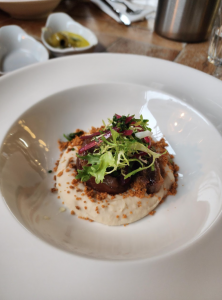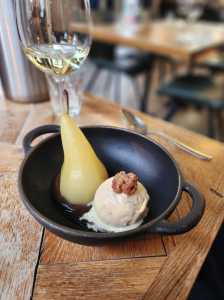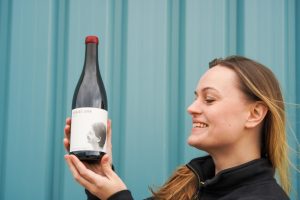Gone Dining: Thom Hetherington at Wreckfish
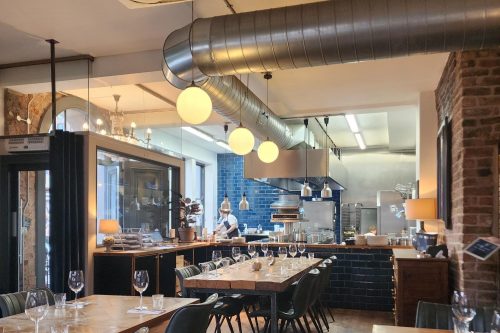
Gone Dining, November 2023.
Wreckfish (soon to be Wreck Bistro), 60 Seel St, Liverpool L1 4BE.
“Restaurants are never pleased to see me”, said my friend, artist Simon Buckley, of Not Quite Light and Rainstorm fame. “It’s always a bit embarrassing.” Simon is pescatarian by choice and avoids both gluten and dairy through necessity. Apparently not every chef welcomes him with open arms. “Don’t worry”, I say, “They’ll be all over this, they’ll love you.”
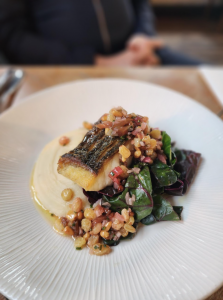
He is a mercurial, maverick chef-turned-restaurateur who struck gold via the uncanny business model of turning the restaurant sector on its head whilst also revitalising its fading dining traditions. I could write an entire column about Gary alone, but I’ll summarise some key points here:
His counterintuitive marketing strategy with his first restaurant, Sticky Walnut in Chester, was to post endless photos of simmering stockpots and desperately quiet lunch services on social media until everyone gave in and turned up. Whilst building his empire he eschewed private equity et al, instead pioneering hospitality crowdfunding, raising £200k in a mere twenty-eight days to open Wreckfish. Like many operators he survived Covid with ‘cook at home’ boxes, but post-pandemic he boldly bought a big industrial shed and flipped that emergency revenue stream into a thriving wedding and events catering business.
So not your average operator, but what of the food? Gary learned his trade under industry legends like Angela Hartnett, and in the kitchens of revered restaurants such as Chez Bruce and The Chester Grosvenor. So yes, whilst there are zeitgeisty touches – spiced butters, pickling and foraging, retro-inspired desserts – beneath it all sits a depth of technical knowledge which powers rich stocks and glossy sauces, poured over dishes of deep flavours and bright colours, all forged into three tight courses, offered as an affordable set menu or a la carte.
It’s a timeless dining format your grandparents would have recognised if they’d put on their glad rags and splashed out at their local fancy hotel dining room, and Gary has helped to bring it back into vogue.
Simon arrived on time and sat down with an apologetic wince. I responded with a smug smile, sliding the menus across the table with all the confidence of a card sharp who was safe in the knowledge that the queen was secreted somewhere about their person. There was a lunch menu, hand-annotated to indicate which dishes suited his dietaries, and a dedicated gluten and dairy-free a la carte menu, full of joy and adventure, with only two meat dishes neatly struck through with biro.
Simon’s face lit up, which ironically was not unlike the urban luminescence he captures in his photography.
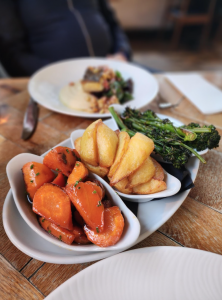
Snacks came and went and hit the spot as our small talk clicked through the gears. Simon took delivery of an endive salad with sweet mustard, walnuts, and port and grape dressing. I had gone for the lamb breast, lightly frazzled to render the fat. It came zinging with dukkah and smoked garlic honey, curled up like an ammonite on a pat of smoked garlic butter bean purée, and topped with a sprig of frisée to preserve its modesty.
Main for Simon was the pan-fried fillet of wreckfish with golden raisins, pine-nut and salted lemon dressing, swiss chard and confit garlic and olive oil mash. I also went for the fish, but out of selfishness rather than solidarity. It takes a stronger man than me to skim past halibut on a menu, especially when served with cavolo nero, roasted and pickled hen-of-the-woods mushrooms, and hazelnut cream.
Both fillets were superbly cooked, flaking with the push of a fork. Simon’s wreckfish was held together by a rectangle of neatly slashed and briskly crisped skin, taut as a hawser, whilst beneath that his mash was night cream smooth, the lemon dressing sweet, sharp, and layered. The hazelnuts in my own dish had a pleasing bitterness from toasting in the pan, and the mushrooms gave up umami juices, split with a spike of vinegar which cut through the nutty, buttery cream.
And these dishes encapsulate Gary’s approach. A mix of bitter and sweet, softness and crunch, with plenty of acidity and grown-up, punchy flavours. It takes both rare talent and extensive R&D to meld so many strong elements into cohesive wholes. Like a perfect three-minute pop song each dish hits with big riffs and sweet hooks, chorus after bridge after chorus leaving you dizzy with dopamine. But as the last notes die away, you can’t help but want to reach for the repeat button.
The accompanying wine list was a neatly compact effort, but as the wine of the day was not to my taste – torrontés is a little too floral for me – we played safe with an easy-drinking El Coto Rioja Blanco made mostly with Viura grapes. Service throughout was both unobtrusive and as sharp as a pin, as evidenced by the promptly hand-annotated menus.
Simon is one of the most thoughtful and intriguing people you could ever hope to meet, a polymath of unexpected conversational turns. As we finished our puddings, including an exemplary poached pear soft enough to cut with a blunt spoon, he and I wound down a discussion which had covered politics, urban regeneration, coping with trauma, friends and eccentrics we both knew well, and the philosophical notion of ‘what is enough?’.
Restaurants are about creating experiential, social spaces where people want to linger – a backdrop to their own interactions. If you get hospitality right – not just the food and the service but prosaic fundamentals like light, acoustics, and temperature – people will stay. And a classic three course bistro structure suits this, it has human scale and rhythms, with fewer interruptions than torturous high concepts or convoluted tastings.
I’ll leave the final words to Simon, spoken as he pulled on his coat and we made ready to leave, much later than we intended. “I’d forgotten what it’s like to eat food that intensely tasty” he said, a beatific smile on his face. “It’s made me really, really happy.” I don’t think you could pay any restaurant a higher compliment, and that’s not a bad note to end on.
Petit Fours
- Staying with Liverpool, online newspaper The Post published an interesting article on whether Liverpool will snag a Michelin star, and indeed whether it matters. With the recently relocated Restaurant 8, as well as Manifest, Roski, Nord and The Art School, the city surely has a better chance than ever before.
And does it matter? A Michelin star won’t immediately make a meal taste better, and there can be an understandable chippiness about an outside organisation decreeing when a city’s restaurants are good enough. Equally, there is a growing feeling in the industry that Michelin is becoming less relevant to contemporary dining.
But the vast majority of chefs or restaurateurs will say a star dramatically improved their careers and their businesses. And without doubt a star can raise profile for a city or a region nationally and internationally, bringing a wave of new and spendy tourism which finds its way into every nook and cranny of the visitor economy. In challenging times – and we wait to see how this week’s Autumn statement pans out for hospitality businesses – we should all welcome that. - And still the openings come. The biggest news of the week is that after a long gestation Tom Barnes, head chef at L’enclume when it won its third star earlier this year, is opening Skof in Manchester’s Noma district. Whilst still under Simon Rogan’s wing, this is very much Tom’s name above the door, and great things are rightfully expected.
Also shaking up the city is Fenix, opening next week in the city’s St John’s neighbourhood. Fenix is a new high end Greek concept – think Mykonos vibes – from Adam and Drew Jones, the sharp but low-key operators behind Tattu.
Also new this month is the ownership of the Jay Rayner-approved gastropub, The Black Friar in Salford. Salboy and DOMIS, who originally redeveloped the iconic but derelict pub, have now handed full control to previous MD, Neil Burke, who along with head chef Ben Chaplain has taken the pub on to national claim. Neil’s company, Bigger Boat, has exciting plans going forward. - Northern hospitality has scooped a number of accolades this month, but most significant amongst them is that L’enclume has been named the best restaurant in the world by the prestigious La Liste, which agglomerates the ratings from over a thousand guides across 200 countries. L’enclume scored 99.5 out of 100, putting it in joint top spot in the list of 1,000 establishments alongside six other restaurants.
Meanwhile, The Telegraph declared Aughton ‘The Michelin-star Capital of Britain’ (cf. my earlier point about stars = profile = footfall!) contrasting its population of a mere 8,000 with its four Michelin stars across Moor Hall, The Barn at Moor Hall, and newcomer Sō-lō. It reminds me of Ludlow over twenty years ago, which turned me into the foodie I am today. It also had four stars across three venues in a town of around 10,000 people, a phenomenon which created a wave of gastro-tourism which sustains to this day.
Let’s hope that constellation of stars and the people who flock to West Lancashire will support a burgeoning hospitality ecology in the area, as the ambitiously refurbed Ring O’ Bells pub, just the other side of Ormskirk, is now also open. It’s now run by the team behind The Merchant and more in Liverpool, and chef Melchor Obongen has a strong track record. - My travels this month took me to Chester, which has a fascinating hospitality landscape. There is a real resurgence of independents in the city with the revamped market at its heart, yet with a wealthy hinterland, strong tourism, a good corporate base and a buzzy student population you can’t help but feel it has plenty more potential. I also attended Peach 20/20 in London, arguably the event for multiple operators, where Mission Mars claimed the coveted ‘Best Bar Business’ trophy.
Whilst in London I enjoyed the city’s best Guinness in the phenomenon that is The Devonshire in Soho. Newly opened, under the stewardship of Oisín Rogers (big hair, fine tailoring), it is the pub of Orwellian dreams – great beers and Tayto crisps downstairs in the bar, live music hidden out back, and a charcoal-powered oven upstairs producing exceptional British chophouse cooking courtesy of Ashley Palmer-Watts. Make it your London local!
As a wild contrast I also tried the outstanding Chisuru in Fitzrovia, which pairs a low intervention French-heavy wine list with refined West African cooking, something I struggle to find up North where West African dishes often seems a bolt on to Caribbean cuisine. Also in London, the R200 awards saw San Carlo’s stunning Alderley Edge site, recently raved about in these very pages, grab the ‘Best New Opening’ gong.
But wherever you choose to eat this month, whether up North or down South, do look out for StreetSmart’s Christmas campaign. Through November and December over 550 leading restaurants will add £1 to your bill, which helps rough sleepers and those in unsuitable accommodation. It means you can overindulge in your festive dining whilst also staying on Santa’s ‘nice’ list.

Thom Hetherington
Thom Hetherington:

